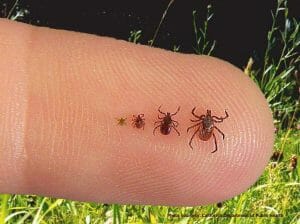Lyme
Cardio-Immu-Knowledgy of Lyme and Associated Disease Syndromes (cILADS): It’s not just about the bug, it’s not just about the microbe; it’s all about you.
Dr. Lowell Gerber Presenting at the ILADS Conference in Chicago, 2018
 There is increasing awareness of “Lyme Carditis” in the Lyme Literate world. It is my opinion that the spectrum of the involvement of the cardiovascular system in Lyme and Associated Diseases is still under recognized and under-appreciated. The most frequent manifestation of heart involvement is “AV Block”. For many practitioners this is synonymous with “Lyme Carditis”. There is more to know.
There is increasing awareness of “Lyme Carditis” in the Lyme Literate world. It is my opinion that the spectrum of the involvement of the cardiovascular system in Lyme and Associated Diseases is still under recognized and under-appreciated. The most frequent manifestation of heart involvement is “AV Block”. For many practitioners this is synonymous with “Lyme Carditis”. There is more to know.
Many common tick borne pathogens are culprits for a wide variety of heart and circulatory “afflictions”. Ticks and other vectors often carry more than one pathogen. Each pathogen has its unique immune interaction with the host leading to the cardiovascular manifestations.
Pathogens, alone, or in combination with other environmental and genetic influences can result in a wide array of heart and circulatory afflictions:
- Conduction system –AV block is the most common and well known
- Atrial and ventricular dysrhythmias: PACs, atrial fibrillation, sick sinus syndrome, VTAC, Sudden Death
- Myocarditis and cardiomyopathy mimicking acute MI and heart failure
- Valve infection including vegetations and perforations
- Pericarditis
- Endothelial invasion resulting in vasculitis and athero-thrombosis/atherosclerosis
- Aneurysms
- High or low blood pressure
I will review some basic cardiology and fundamentals of immunology in the spectrum of heart and circulatory responses to ischemic heart disease and infection. The innate and adoptive immune responses and auto-immunity are involved in clinical heart disease as well as Lyme disease.
For example, Borellia interacts directly with the mast cell involved in the manifestation of many cardiovascular disorders. Bartonella Heneslea predisposes to atherogenesis by invading Endothelial Progenitor Cells, and may have a role in the global pathogenesis of atherosclerosis. Multiple organisms form biofilms which shield from antibiotics and the immune system, a potential contributor to persistence. The biofilm can also result in blocked flow through the vessel.
Treatment considerations will include an overview of cardiac and anti-microbial therapy including allopathic prescriptive and alternatives including herbal, energy, ozone and infra-red therapies.
The emerging role of Membrane Medicine and focused nutrient therapy to establish healthy and structurally sound cell membranes in order to deter pathogen invasion and to facilitate recovery and regeneration will be presented at the ILADS Conference in Chicago.
